Rollins, Gallup Host D.C. Event for Release of Public Health Priorities Survey
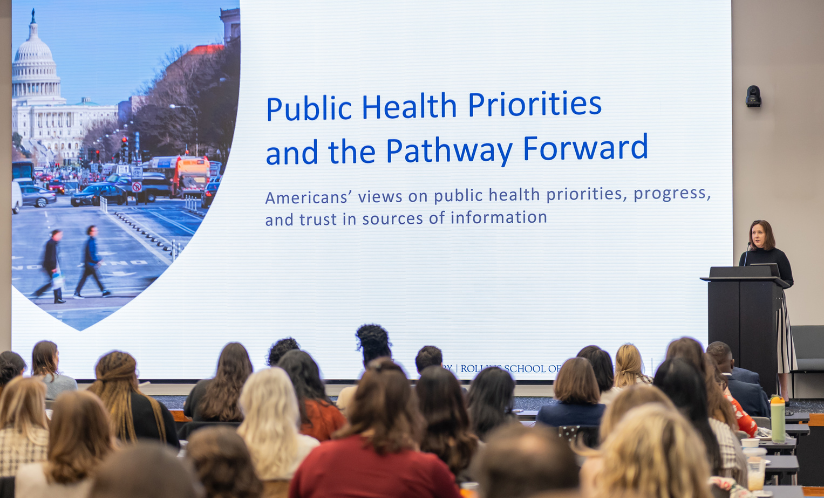
WASHINGTON, D.C.—Emory University’s Rollins School of Public Health and Gallup partnered to host an event at Gallup World Headquarters on Wednesday morning to mark the release of a new Rollins-Gallup Public Health Priorities Survey.
The survey of 2,121 U.S. adults provides timely insights into what public health issues Americans want leaders to prioritize and who they trust most for important health information.
Watch the full event here.
“At a time of such divisiveness, we remain connected in our shared concern about our nation's health. In this spirit of seeking out areas of agreement… our aim with this survey is to provide elected officials and the Trump White House with a guide to inform bipartisan decision-making,” Rollins Dean M. Daniele Fallin, PhD, said during her opening remarks at the event.
“The results point to areas of agreement and priorities for our country. They give me hope for a path forward, hope for students like ours pursuing degrees in public health at the Rollins School, as well as students and public health workers across our nation and indeed for our nation's health itself.”
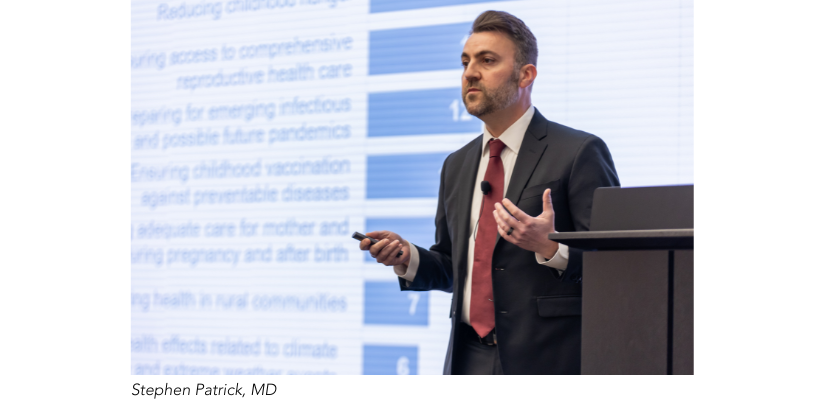
Stephen Patrick, MD, chair of the Department of Health Policy and Management at Rollins, provided an overview of the survey highlights, including:
- Health care access and affordability ranks as Americans’ top priority.
- A majority of Americans said the federal government could address their top three priority issues more effectively than state governments.
- Americans chose health care providers, scientific researchers, and the Centers for Disease Control and Prevention (CDC) as their most trusted sources of public health information. Political leaders ranked at the bottom, behind social media and digital influencers.
“One of the things that strikes me when I look at the 15 issues we polled on, is that they affect people directly. These are kitchen table issues that people discuss with their family and friends,” said Patrick. “I think it’s a reminder that public health touches people in ways they don’t always anticipate. It has an effect at the federal, state, and local levels. Some of the highest-rated concerns we see from Americans—safe water, for example—is managed locally in many areas and by public health agencies. So, understanding the role of public health in people’s daily lives is really important overall, but it is also important for us as we think about improving the public’s health and having messaging that speaks to people where they are in their local communities.”
A trio of fireside-style discussions—featuring Gallup CEO Jon Clifton; Sen. John Hickenlooper (D-Colo.); Joneigh S. Khaldun, MD, president and CEO of the Public Health Accreditation Board; and Richard E. Besser, MD, president and CEO of the Robert Wood Johnson Foundation—followed the presentation of the survey results.
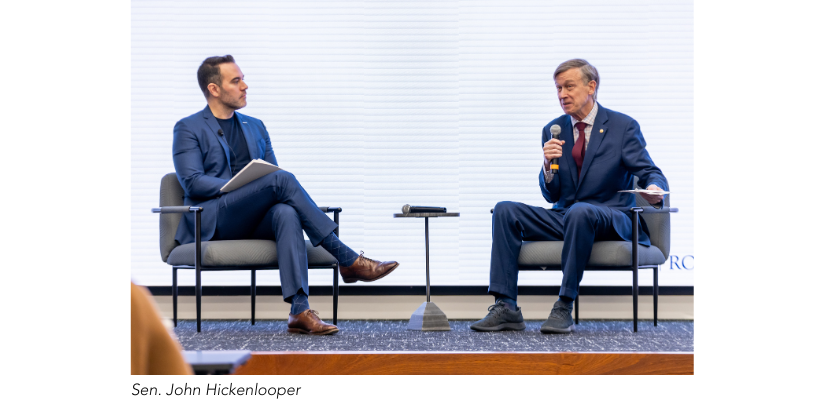
When asked about trusted sources of information, Hickenlooper said the federal government needs to work to regain the trust of the public.
“Right now, there's a very complex relationship people have with the federal government. Many people feel deceived. They don't trust it. … But I think in making sure we respect science, we realize it’s not perfect,” he said. “There's a bunch of issues that we should be willing to face up to the mistakes we made and learn from it. And right now, it's become so politicized and weaponized that people don’t want to be on the record of making comments on it.”
To help build trust and help the public gain a better understanding of the importance of public health initiatives, Khaldun stressed that scientists and health care providers must learn how to communicate better to people outside of their fields.
“I think, in general, people who are scientifically trained are awful communicators. I'm sorry, I'm scientifically trained too. We think that because we publish some 50-page studies, share all the data, and share all our graphs, that everyone is going to understand it. That does not work. We have to make sure we are better communicators,” she said.
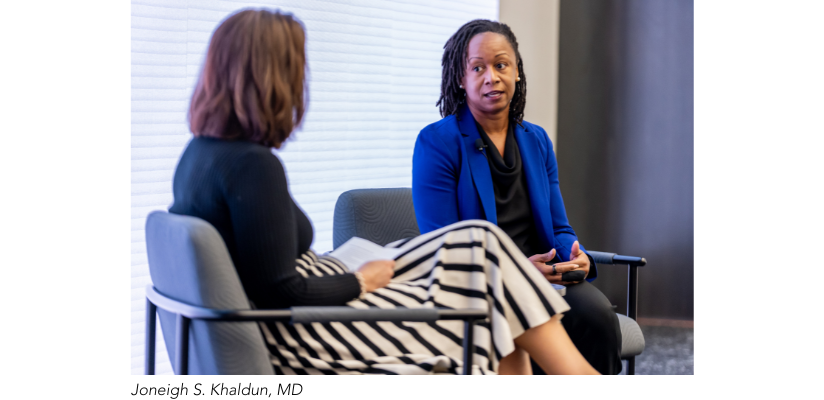
“This means communicating succinctly to lay people but also communicating to businesspeople and politicians. … You need to be able to say, ‘This is the value, this is the ROI, and this is how much money you can potentially make or save.’ You have to be able to speak the language of other professionals.”
Khaldun also spoke about the current national conversation around federal funding for public health. “When you're talking about not funding the federal government for public health, it's not just the CDC, there are so many other agencies that have a lot to do with the health of communities and that trickles down. It trickles down to the state, it trickles down to the locals, and it puts more pressure on the state and local government to fund and afford the foundation of public health services. And in these fiscal environments, those things tend to unfortunately get cut,” she said. “Who wants to live in a community where you don't have enough restaurant inspectors? Or where moms can't get the food their babies need? Or if an outbreak happens, no one really knows what's happening? I don't know. No one has ever said that.”
When asked about his thoughts on the survey, Besser said the results clearly show the critical importance of Americans choosing health care access and affordability as their top priority.
“What we're hearing in this poll is that people are still concerned about their access to health care, and I would say it's broader than that. It's access to high quality, comprehensive, affordable health care,” says Besser. “If you dig into that, we're failing on each piece of that. People are finding, even if they have health care, the cost is too high, the copays are too high, the hurdles people have to jump through to get the services they want are too high. And I hope that this administration comes at it with fresh eyes.”
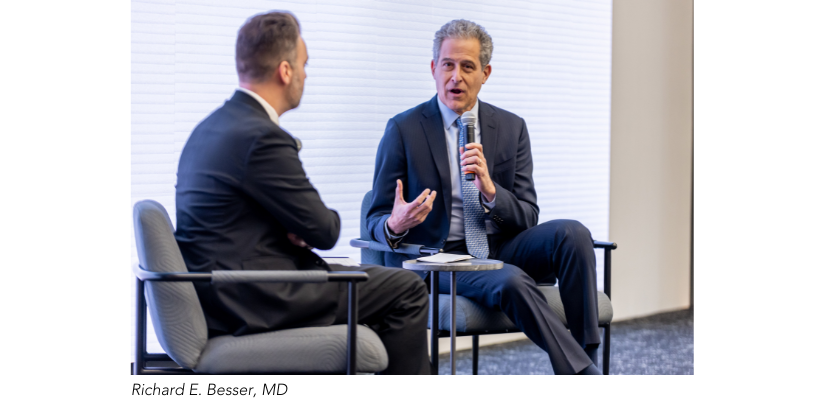
Besser spoke to another one of Americans’ top public health priorities: reducing chronic disease. Addressing chronic disease is about “changing the communities we live in so every community is a community in which health thrives, where it's the norm because you have streets where you can be outside and play. It's not that kids don't want to play. It's that so many kids live in neighborhoods where they can't play. And it's not that parents don't know that eating a Big Mac every day isn't the way to go, it’s that parents don't have enough money to be able to provide anything but that kind of food,” he said.
“So, how can we continue to address those core critical issues of equity? Because you can't look at a single public health issue [without that lens],” Besser said. “It's not something we can ignore as we are moving forward in the next several years.”
Besser also talked about the role of philanthropy right now. “Philanthropy has a special role I think in this moment because we are not beholden to federal dollars and we are not elected, and we are not private sector that's looking at the bottom line. We can hold true to these values and push them support efforts. And I think it is really important that we do that at this moment because I think the vision is of an America where health is no longer a privilege.”